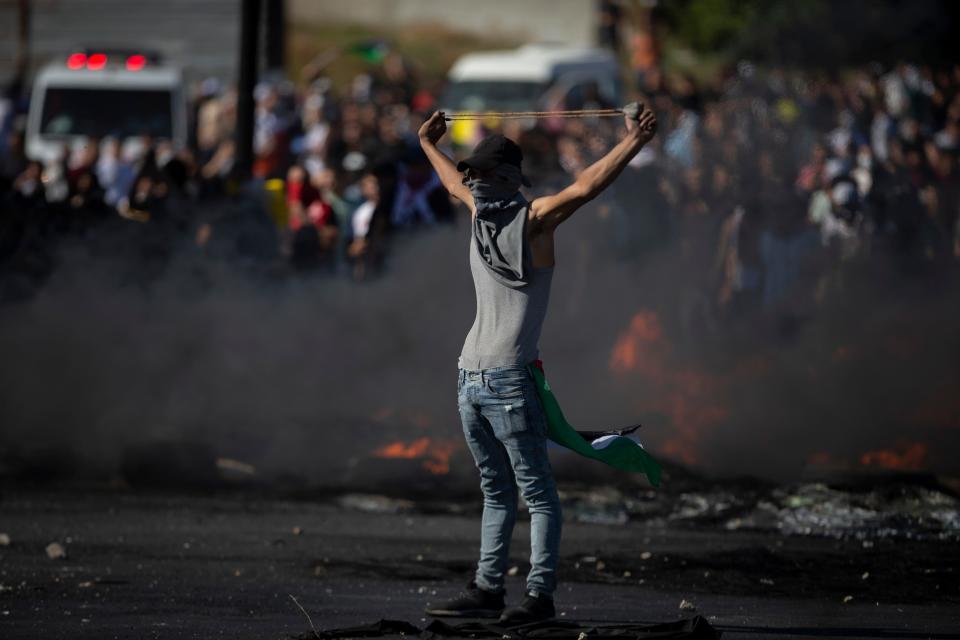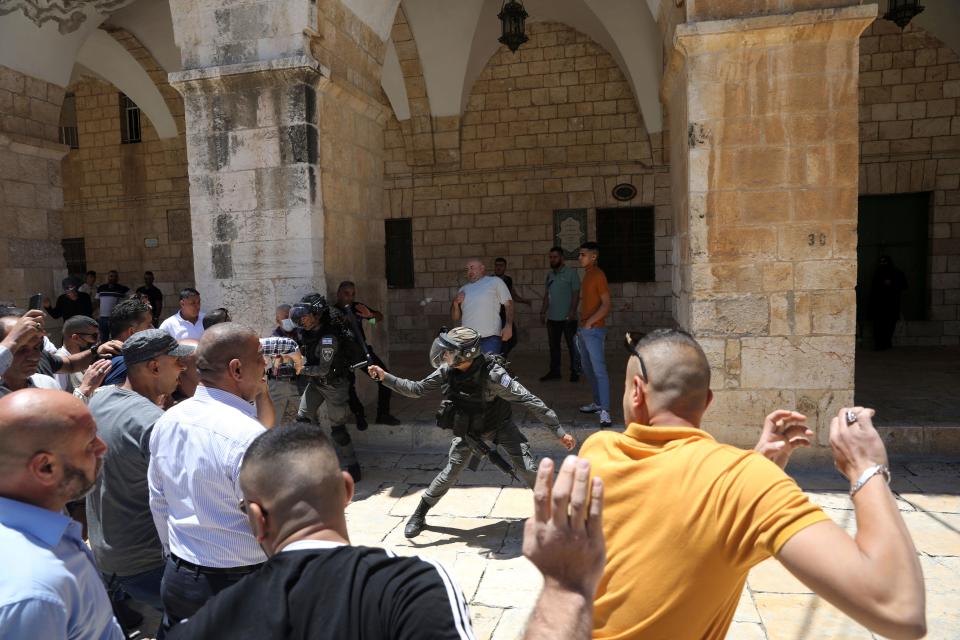'Every incendiary ingredient imaginable': Here's what sparked worst Mideast violence since 2014
WASHINGTON – Threatened evictions of Palestinian families by Jewish settlers in East Jerusalem that revolve around issues of national identity. Heightened religious sensitivities as Ramadan overlapped with significant dates on the Hebrew calendar. Political crises in Israel and the Palestinian Authority that weakened the political systems on both sides and gave an incentive for escalation.
Those are factors that sparked the deadliest violence in years between Israelis and Palestinians.
Airstrikes have killed more than 200 Palestinians, according to the Gaza Health Ministry. Rockets launched into Israel by Gaza’s militant Hamas rulers have killed a dozen people.
In an unusual outbreak of mob violence, Jewish and Palestinian citizens are fighting each other in the streets of Israel. Vehicles and buildings have been damaged in vigilante attacks. Protests erupted in the occupied West Bank.
This is not merely another round in the war between Israel and Hamas, according to Natan Sachs, director of the Center for Middle East Policy at the Brookings Institution. It involves national narratives and grievances, religious sanctity and symbols and communal violence not seen in decades.
“The past few weeks,” Sachs wrote on the Brookings website, “seem to have brought to the fore every incendiary ingredient imaginable.”
The events have prompted pro-Palestinian protests across Europe and the USA and increased pressure on President Joe Biden to do more to resolve the conflict.
Here’s a look at how events unfolded and quickly exploded.
How did it start?
In East Jerusalem, a group of Palestinian families could be evicted from an Arab neighborhood where they’ve lived for decades. The Sheikh Jarrah neighborhood was repopulated with Palestinian refugees by the Jordanian government and the United Nations after the first Arab-Israeli war in 1948.
Israel captured East Jerusalem in the war of 1967. Although the annexation has not been recognized internationally, Jewish settlers claimed property in the neighborhood whose fate is in the hands of the Israeli courts.
Palestinians contend East Jerusalem, which they hope will be the capital of a future state, belongs to them.
The property clash ignited protests, which quickly escalated, as Palestinians felt the reverberations of Nakba, the exodus of Palestinian Arabs who were expelled or had to flee their homes during the war in 1948.
“Every deep-seated image of dispossession, the Nakba of 1948, and the current imbalance of power resurfaced, with the Palestinian Nakba Day, no less, commemorated on May 15,” Sachs wrote in his analysis of the roots of the unrest.
More pressure on Biden: Nancy Pelosi calls for cease-fire in Israel-Palestinian conflict

How did the conflict grow?
As the deadline approached for a court decision on the evictions, tensions mounted, exacerbated by overlapping days of religious and historical significance to Muslims and Jews.
During the Islamic holy month of Ramadan, Muslims congregate outside the Damascus Gate, a historic entrance to the Old City of Jerusalem, to break their fast. This year, Israeli police prohibited the practice, clashing nightly with young Palestinians who protested the ban.
On the evening of May 8, many Muslims gathered at Al-Aqsa Mosque, the hilltop compound revered by both Muslims and Jews, for one of the most sacred nights on the Islamic calendar.
Around the same time, some Israeli Jews were getting ready to celebrate Jerusalem Day, a national holiday commemorating Jewish control over the Old City that was secured during the war in 1967.
Despite the unrest around the Damascus Gate, Israeli police gave the go-ahead for thousands of Israelis to make their traditional March of Flags along the usual route through the gate.
That decision was reversed at the last minute, but Israeli police, who usually don’t control security at the mosque complex, sent in officers in riot gear.
“That was seen both as a provocative act and also one that violated the sanctity of the Al-Aqsa Mosque complex on a holy night of Ramadan,” said Jon Alterman, senior vice president at the Center for Strategic and International Studies.
Though it’s unclear what set off the ensuing violence at the mosque, Israeli police fired rubber bullets and stun grenades at protesters who hurled rocks at police. More than 200 Palestinians were injured.
Videos of the stun grenades being thrown into the mosque while people were praying went viral.
“Especially now in the day of social media and 24-7 satellite channels, it’s wildfire,” said Osamah Khalil, a Syracuse University history professor who specializes in Middle East affairs.

How did the rocket attacks start?
Hamas, the militant Islamic group that controls Gaza, saw an opportunity to cast itself as the defender of Al-Aqsa, the third-holiest site in Islam.
Hamas warned Israel it would face consequences unless police were removed from the compound and from the Sheikh Jarrah neighborhood.
Still, the Israelis had no sign that they were on the verge of war, Alterman said.
“This was a decision that Hamas made to start launching rockets into Israel in very large numbers, very suddenly, and took what was a set of rising tensions and lit a match and started war,” he said.
The conflict broadened far beyond just a Jerusalem story.
Sachs wrote that Hamas surprised Israel “not only with its appetite for conflict now but also with its improved military capabilities.”
Though Hamas killed a handful of Israeli civilians and sent millions to shelters, Sachs continued, Gaza was at war with a far superior power.

How were Palestinian politics a factor?
Hamas had political reasons to attack. Hamas wanted to be seen as the leader of the Palestinians when Palestinian President Mahmoud Abbas is weak.
Abbas, 85, head of the Palestinian Authority whose term was supposed to expire 12 years ago, had just canceled legislative elections. His party had been trailing in the polls, and there was fear that Hamas would win.
“So here is Hamas asserting that it is defending Palestinian rights and asserting its legitimacy against the Palestinian Authority that was unable to defend Palestinian rights,” Alterman said.
Peter Beinart, editor at large of Jewish Currents, a left-leaning magazine, and a journalism professor at the City University of New York, said Abbas and Hamas are among those who share blame for the crisis.
The elections Abbas canceled might have offered Palestinians another outlet for political action, Beinart wrote in an essay on Substack, an online publishing platform. And Hamas’ military response to Israel “distracted from a popular, largely nonviolent uprising, and made it easier for Israel to justify using brutal force.”
The cancellation of elections sapped a lot of energy, contributing to a “total despair among Palestinians,” said Shibley Telhami, a Mideast scholar at the Brookings Institution. That despair was fed by the pending evictions from the Sheikh Jarrah neighborhood, the raid on the Al-Aqsa Mosque, and the initial lack of reaction by the international community.
“All of these have galvanized the Palestinians in ways we have not seen in the past few years,” he said during a Brookings’ podcast discussion of the situation.
Another troubling development that hasn’t been seen in a while, he said, is the spread of the conflict from East Jerusalem and the West Bank into Israel itself.
Sachs called startling the images of communal violence not seen in decades between Israel’s Jewish majority and the 21% of Israeli citizens who are also Palestinians.
Key players: A look at the roles and motivations of those engaged in the Israel-Palestinian conflict

What role did Netanyahu play?
It wasn’t just Hamas that benefited from escalation.
Israeli Prime Minister Benjamin Netanyahu has been unable to put together a ruling coalition and faces not just the possible end of his political career but also legal corruption charges.
The anti-Netanyahu coalition that was coming together has fallen apart. Netanyahu will remain prime minister until another likely election – the fifth in about two years – is held.
“It really looked like it was up. It was over. And then he pulled this out of his hat,” Khalil said. “He's riding a rally-around-the-flag effect to stay in power."
Telhami, of the Brookings Institution, said the anti-Netanyahu coalition would have required the support of one of the Arab parties. Now that’s not possible.
“There’s no question, whatever role the prime minister played, no question that he benefits,” Telhami said. “I’m not sure that he wanted an all-out war, but he benefited from the initial escalation.”

Were Trump administration policies a factor?
President Donald Trump ramped up U.S. support for Israel, breaking with decades of Washington policy to move the U.S. Embassy from Tel Aviv to Jerusalem in 2018.
Although U.S. law recognizes Jerusalem as Israel’s capital, presidents had delayed moving the embassy, which Palestinians vociferously protested. Any move was to be considered as part of a negotiated peace agreement between the Israelis and Palestinians.
Trump’s decision, according to Khalil, signaled to Netanyahu that Jerusalem was “completely fair game” in Israel’s long-standing effort to “change the shape of what is Jerusalem.”
It also signaled, he said, that “the rights of Palestinians are completely negated to the city, including those who live within it.”
Though Alterman said he isn’t sure that Trump’s unique alliance with Netanyahu – including a series of agreements that formalized diplomatic relations between Israel and four Arab countries – directly contributed to the situation, he said the moves added to Israelis’ belief that “Palestinians weren’t a factor anymore.”
“They could have contributed to a miscalculation that the Palestinians wouldn't react,” he said.

Could the Biden administration have prevented escalation?
Telhami said the events took the Biden administration by surprise.
Israeli-Palestinian tensions had not been a priority for the administration. In addition to being focused on the pandemic and the economy, Biden concentrated on reviving the 2015 Iran nuclear agreement. Israel opposes Biden’s efforts to rejoin the nuclear deal with Iran, and Biden “certainly didn’t want to open another front of confrontation with Israelis over Israel-Palestine,” Telhami said.
Beinart argued Biden could have helped prevent the escalation by pressuring Israel to stop evictions in East Jerusalem and to allow Palestinians there to vote. That would have made it harder for Abbas to cancel Palestinian elections and “could have let Israeli voters know there would be a price to pay for continuing to elect governments that entrench Israeli control over millions of Palestinians who lack basic rights.”
Biden restored aid for Palestinian refugees that Trump cut, but the president has not otherwise devoted much attention to the issue, Khalil said.
“I don't think Biden wanted anything to do with this issue. He wanted to manage it, and by managing it meaning ignore it,” Khalil said. “And now, here it is.”
From friendly to frosty: Biden and Netanyahu's decadeslong relationship tested by crisis
More: Biden has yet to reverse many of Trump's pro-Israel policies he labeled 'destructive'
More: Biden expresses support for Israel, Gaza cease-fire amid pressure from own party
This article originally appeared on USA TODAY: What caused the worst violence in years between Israelis, Palestinians

 Yahoo Movies
Yahoo Movies 